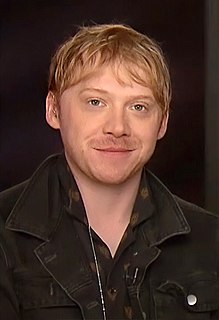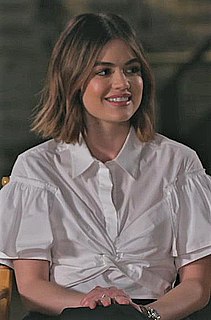Цитата Руперта Гринта
Одна из прелестей профессии актера заключается в том, что ничто на самом деле не должно иметь смысла. Вы просто делаете это, живете этим и надеетесь, что оно выйдет наружу, и пытаетесь найти истину в тексте по-своему, и, надеюсь, вы сможете найти истину в тексте, а все остальное само придет.
Связанные цитаты
Я думаю, что ваш текст [сценарий] — это все; это то, что информирует вас; это то, что дает вам данные обстоятельства. Затем вы берете это и добавляете свой собственный творческий подход и свой взгляд на вещи, и вы делаете это личным. Вот что делает этот персонаж и этот текст уникальными для вас, когда вы персонализируете их. Я думаю, в этом и заключается твоя работа как актера.
Вдохновение — все в сценарии, в тексте. Итак, что бы это ни было, будь то фильм или книга, которую нужно проиллюстрировать, что угодно. Все, что вам нужно знать, есть в тексте. Итак, дело в том, чтобы найти правильный тон и голос, правильный стиль, правильный способ выражения эмоций в рассказе или в месте действия рассказа, но все это в тексте.
Мы живем в век довольно скептического отношения к истине, к ее существованию». Существует «тенденция верить, что ничто не является окончательным, и думать, что истина дается по согласию или по нашему желанию. Возникает вопрос: действительно ли существует «эта» истина? Что правда? Можем ли мы это знать? Можем ли мы найти его?
Будьте скептичны, но не в качестве социальной позиции, не претендуя на то, что вы настолько умны, что не можете верить тому, что говорят другие люди. Дело не в том, чтобы быть правым и делать всех остальных неправыми. Нет, вы скептичны, потому что без сомнения знаете, что каждый живет своей историей и в своей истории имеет свою правду. Но это правда только в их уме, точно так же, как ваша правда есть правда только в вашем уме и ничьей другой.
Актерство — это многое. Актерство — это, конечно, игра реплик, но это гораздо глубже. Актерское мастерство - это говорить правду и пытаться найти правду в человеческой ситуации, которую сценарист обрисует со всем умением, на которое способен сценарист; но, в конце концов, это всего лишь карта пути. Работа актера состоит в том, чтобы угадывать и воплощать истину, и находить ее.
Я слишком много анализирую, до такой степени, что это влияет на мою жизнь. Например, когда я разговариваю с мальчиком, я чрезмерно анализирую текстовое сообщение, которое он отправил. И я должен думать про себя: «Просто расслабься. Какой-то парень прислал мне смс. Вот и все. Не читайте в нем что-то, чего там нет. Просто радуйся, что он отправил тебе текстовое сообщение!
Вот немного возмутительный совет: не уважайте текст. То, что вы что-то записали, не означает, что это имеет право на существование. Если ваш внутренний редактор может найти лучший способ сказать что-то, выбросьте исходную версию и используйте новую. Если вы не можете найти лучшего пути, и проход действительно не очень хорош, выбросьте его.



































